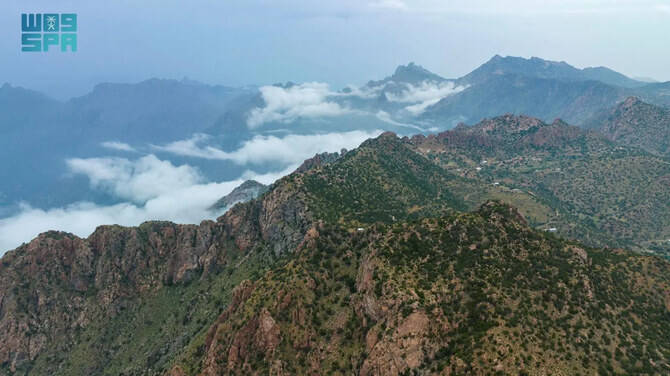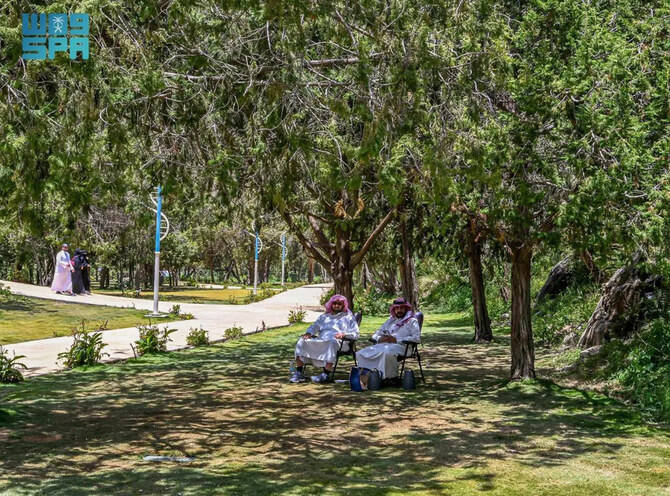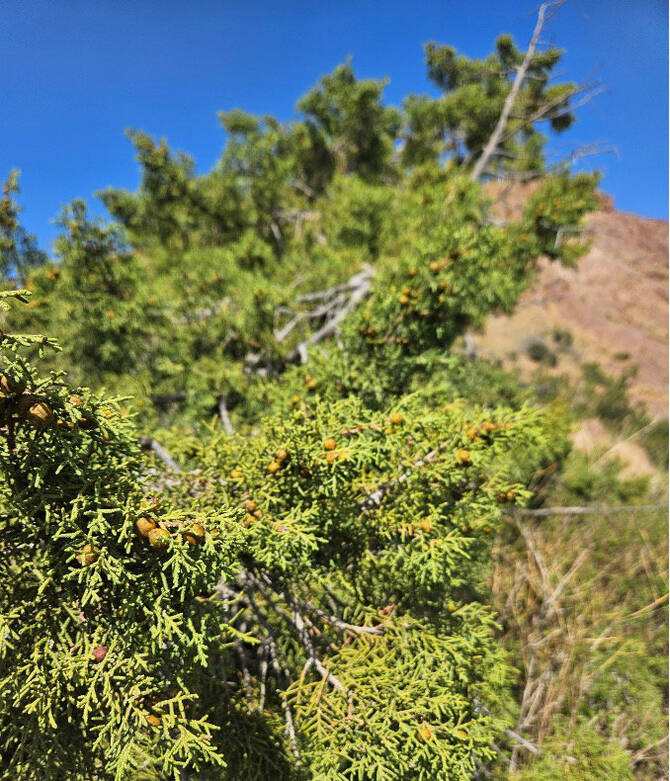RIYADH: High in the misty mountains of southwestern Saudi Arabia, the juniper tree — known locally as the “lady of trees” — has long stood as a quiet sentinel over the Kingdom’s highland ecosystems.
Revered for its resilience, ecological role, and cultural legacy, this ancient species is now the focus of a national conservation drive to reverse decades of environmental decline.

Juniper woodlands flourish between 2,500 and 3,000 meters above sea level in regions such as Taif, Al-Baha, and Asir.
These evergreen conifers, draped in needles and peppered with cones, are more than just picturesque. They are ecological relicts — living remnants of ancient Afromontane forests that once stretched across parts of Arabia.
“Juniper trees have created a unique microclimate in areas where arid and semi-arid ecosystems such as deserts, mountains, and high plains are prevailing,” Liubov Kobik, a junior environmental consultant at Terra Nexus, told Arab News.

For centuries, the juniper tree has proudly stood as a symbol of picturesque beauty in Al-Baha region, adorning its slopes and mountain peaks with vibrant green hues. (SPA)
These woodlands offer a rare sanctuary for biodiversity in a country better known for its deserts.
“These areas are nowadays called juniper woodlands and are considered as biodiversity hotspots supporting thousands of vascular plants, unique and mammalian species,” Kobik added.
Opinion
This section contains relevant reference points, placed in (Opinion field)
The forests are home to rare and endangered species such as the Arabian leopard, hamadryas baboon, and the endemic Asir magpie.
Ecologically, junipers stabilize mountain slopes, protect against soil erosion, and offer nesting and foraging habitats for a wide range of species. Their berries are a food source for wildlife, while their dense canopy helps retain moisture and moderate temperatures.

Juniper berries are a food source for wildlife, while its dense canopy helps retain moisture and moderate temperatures. (Pexel photo)
“Unlike most of Saudi Arabia, the Asir mountains receive relatively high levels of rainfall, particularly during the summer monsoon season,” Kobik said.
“This moisture supports a variety of vegetation types, from dry acacia woodlands at lower altitudes to more humid and dense juniper forests in the highlands.”
But these vital ecosystems are under threat. Long-term climate change, rising temperatures, and erratic rainfall have caused a decline in juniper populations.”

Junipers stabilize mountain slopes, protect against soil erosion, and offer nesting and foraging habitats for a wide range of species. (Photo by Liubov Kobik)
Rising temperatures and periodic droughts … are caused by climate change, resulting in reduced and increasingly erratic rainfall patterns, characterized by extended dry seasons and infrequent yet more intense storms,” Kobik said.
“This disruption in natural water availability hinders the establishment of young juniper seedlings, making successful regeneration increasingly uncommon,” she said. “Less rainfall and rising temperatures are increasing evaporation rates, drying out soil faster.
“This makes growing conditions tougher for seedlings and saplings, which struggle more with heat and drought compared to mature trees. Consequently, the natural replacement of older trees by new growth is greatly hindered.”
DID YOU KNOW?
• Jabal Soudah in Asir is 3,015 meters above sea level and is covered with juniper trees.
• The common juniper has the largest geographic range of any woody plant in the world.
• Unlike other trees, the juniper grows in acid and alkaline soils. Juniper bushes can live up to 120 years, with the oldest recorded specimen aged 255.
Overgrazing and land development have compounded the crisis. Livestock, particularly goats and sheep, often trample young saplings before they have a chance to mature.
In response, Saudi Arabia is taking action. Soudah Development, a project backed by the Public Investment Fund, has launched a major reforestation campaign that has planted nearly 165,000 native trees — including junipers — throughout the highlands.

Measures are being implemented at Asir National Park to limit deforestation, overgrazing, and land development. (Photo by Liubov Kobik)
“Additionally, Asir National Park, established in the 1980s, functions as a significant protected area where juniper forests are a conservation priority,” Kobik said.
“Within the park, measures are implemented to limit deforestation, overgrazing, and land development — factors that have historically led to the reduction of juniper populations.”
Kobik explained how authorities are partnering with the National Center for Vegetation Development and Combating Desertification to promote regeneration.

Juniper berries are a food source for wildlife, while its dense canopy helps retain moisture and moderate temperatures. (Photo by Liubov Kobik)
“Park authorities … are undertaking habitat restoration initiatives that include fencing regeneration zones, controlling livestock access, and monitoring tree health,” she said.
“Protective fencing has been installed around the most sensitive zones to facilitate natural regeneration by preventing goats and sheep (or other livestock) from accessing the areas.
“These measures address a primary issue hindering juniper recovery: although seeds germinate, saplings often fail to mature due to browsing and trampling by animals.”

A park ranger of the National Center for Vegetation Cover Development and Combating Desertification on patrol at the Sarawat mountains. (SPA)
Beyond their environmental value, junipers hold deep cultural significance in Saudi Arabia. For generations, their wood has been used to craft ceremonial objects and household tools.
Their berries are used in traditional medicine to treat ailments such as colds and stomach issues. Juniper oil, prized for its natural fragrance, also finds its way into perfumes and soaps.
Once overlooked in the rush of modern development, these ancient trees are now being championed as symbols of sustainable progress.
By safeguarding juniper woodlands, Saudi Arabia is not only protecting its natural heritage — but also restoring life to its greenest, most storied mountains.




















